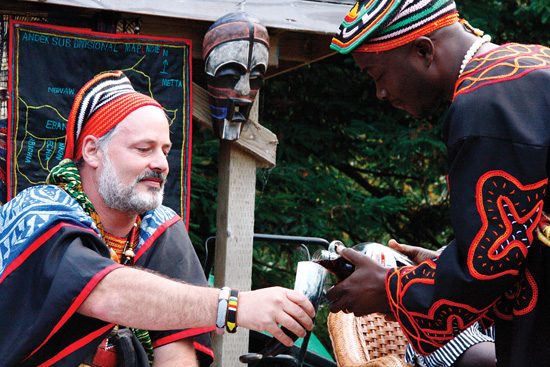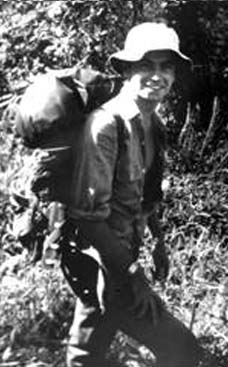
“I was living in the city in Cameroon when I heard of the white man living in our village who lived as we did,” Atiabet said. “A couple of others from the Peace Corps had been there before, but they didn’t get soaked into the culture and traditions. He fits better than some of us.” Benson married in that village and still shoulders the health care and education costs of the boy and girl gifted to him as a wedding present by the Ngie. He lived among the Ngie from 1991-93. Since then, he’s made three return trips to Cameroon to train incoming volunteers. After cooking goat meat over a fire and laboring to make taro root and greens and chicken in peanut sauce, Benson changed into the flowing orange robe and beaded hat that go with the title. As a kwifon, his new home is an extension of the tribe’s Royal Palace. “When the real chief sleeps, I become the chief,” he said by way of explanation. “It’s second in command, unseen and in the background. The title holds more clout here than there because there aren’t many traditional rulers here.” Benson is a beachhead of sorts. For the seven years before he moved north to take a job with WHO, he assisted Cameroonians fleeing the instability of their homeland to make a life in the Bay Area. “I’m a keeper of the culture,” Benson said. “Part of my job is to keep the dances, stories and languages alive.
Craig Benson spent two years as a Peace Corps volunteer in Cameroon the village of Andek, one of 19 villages in an Ngie community that measures about 20 square miles
Shared culture brings people together at Ngie reunion
by Carol Harrison, 9/22/2007
Caption: Ernest Ekawa, right, serves a libation to Chief Craig Benson, left, during a ceremonial meeting at Benson’s home in Eureka. Daniel Solomon/The Eureka Reporter
He is a kwifon of an African tribe, a night chief of Cameroon’s Ngie community who had been laboring in his Cutten kitchen since 6 a.m. preparing traditional dishes for the monthly meeting of the Northern California Ngie Family Union.
“Look at him. The culture is embedded in him,” said Victorine Atiabet, one of 15 Cameroonians to make the seven-hour drive north from the Bay Area. They arrived in the late afternoon Sept. 15 for a three-hour visit, then piled back into two cars to make the trip back home.
“If it were someone else, you would be seeing two or three people here,” she said. “Because of the love we have for him ... he pulls us.”
“He” is a white man, Craig Benson, who works as a watershed program manager for the Redwood Community Action Agency. He spent two years as a Peace Corps volunteer in the village of Andek. It is one of 19 villages in an Ngie community that measures about 20 square miles — “about the size of the Hoopa reservation,” Benson said.
“I was living in the city in Cameroon when I heard of the white man living in our village who lived as we did,” Atiabet said. “A couple of others from the Peace Corps had been there before, but they didn’t get soaked into the culture and traditions. He fits better than some of us.”
Benson married in that village and still shoulders the health care and education costs of the boy and girl gifted to him as a wedding present by the Ngie. He lived among the Ngie from 1991-93. Since then, he’s made three return trips to Cameroon to train incoming volunteers.
After cooking goat meat over a fire and laboring to make taro root and greens and chicken in peanut sauce, Benson changed into the flowing orange robe and beaded hat that go with the title. As a kwifon, his new home is an extension of the tribe’s Royal Palace.
“When the real chief sleeps, I become the chief,” he said by way of explanation. “It’s second in command, unseen and in the background. The title holds more clout here than there because there aren’t many traditional rulers here.”
Benson is a beachhead of sorts. For the seven years before he moved north to take a job with WHO, he assisted Cameroonians fleeing the instability of their homeland to make a life in the Bay Area.
“I’m a keeper of the culture,” Benson said. “Part of my job is to keep the dances, stories and languages alive.
“The other part of it is to teach people how to live here, sort of America 101. How to look for work, get a driver’s license and Social Security number, do a resume — all the stuff we take for granted.”
“When he left in 1994, it was to me like I would never see him again,” said Ernest Ekawa, the founding president of the Ngie Cultural and Development Organization. “He revolutionized our farming techniques and contributed to our understanding of conservation.”
Ekawa received a graduate degree in international relations in Denmark before coming to the U.S. for research. He said there are four main Ngie branches in the United States: San Jose; Los Angeles; Silver Springs, Md.; and middle America, with concentrations in Iowa and Minnesota.
Ekawa said his last check with the Cameroonian embassy revealed 500,000 of his countrymen as documented immigrants from a country of roughly 200 million people.
“Cameroon has 250 ethnic groups and the Ngie are one,” he said. “English and French are our national languages, but all of the communities have different languages, even within the community.”
Benson’s gathering included not only Cameroonians, but also other members of the African community in Humboldt County and Americans who have lived in Africa. Among them: the three generations gathered around Ghana’s Nick Atigedewe.
“I’d gone there with the Peace Corps from ’96 to ’98,” recalled his wife, Rebecca. “We married, I came home and it took 10 months to go through the interviews before they let him come here.”
A camping trip to Myers Flat coupled with Atigedewe’s desire to get a college education in an area with a cheap cost of living brought them to Humboldt State University, where he earned his computer science degree in December 2004.
Now working for Humboldt Merchant Services, the Atigedewes came to the Benson gathering with their son, Adi, and Nick’s visiting parents, John and Luciana.
“We integrate quickly and we are hardworking,” Ekawa said. “We value education.”
That was apparent in every conversation. Felix Atoh emigrated five years ago. A civil engineer in Cameroon, he was re-educated as a nurse. So, too, was Victorinae Atiabeh.
“Most of them look to health care because there are so many jobs there,” Benson said.
Henry Asate, president of the San Jose group, is an assistant manager at a 7-11 who worked in Cameroon as a biology teacher. Now, five years into his move, he hopes to return to school again to train for something more.
“It is hard to come here, work, have shelter and go to school,” Atoh said.
“Most of the people here have bachelor degrees because we know that is what will prepare us to realize our dream, which has three main objectives,” Ekawa said.
Integrating economically, socially and culturally is one of those objectives, but not to the exclusion of two others.
“We want to keep our culture alive and show the people of the United States who we are,” Ekawa said. “And we want to remember where we come from. We want to share the blessings of a newfound land with the masses back home by being strong and reliable partners.”
Ekawa, Benson and others spoke of communities with neither electricity nor water.
Even so, Africa is in Benson’s blood.
“For me, there is always a sense of homecoming because Africa is a place where God is universally acknowledged and felt,” he said.
“We left a huge plight behind,” Ekawa said. “Health care is poor; the infrastructure has collapsed. People are dying of diseases we can cure.”
Ekawa’s organization is nonprofit and in the midst of obtaining tax-exempt status.
“We already contribute and support a list of projects back home,” he said. “We are still putting our operation together before we can invite outsiders to assist.”
The Ngie community holds a national convention annually. Two years ago, Benson took a lead role in the San Jose gathering; last year it was in Washington, D.C., and next year in Minnesota.
“The best convention we had of any so far was in San Jose,” Ekawa said with a nod toward Benson. “He has done so much to earn the respect he deserves. He did a lot when he was in my village and our culture moves with our people. By our traditions of power and title, we give him that respect here.”
“They treat my wife, Julie, as a queen and our daughters (Marina and Sylvie Rose) like princesses,” said Benson, whose seat of honor was the only one not up for grabs that Saturday.
“There were about a dozen Ngie when I went to San Jose in 2000,” Benson said. “Now there are about 50 or more. Our children have grown up with their kids.
“It’s weird, kind of unique. We have the tribal meeting monthly and Julie and I host two times a year. But when we moved the ‘palace’ to the ‘village’ they wanted to come to greet the ‘chief’ in his new home.”
“The ride went on and on and on,” laughed Christina Yuombi. “I enjoyed the scenery — it was beautiful. I wouldn’t mind staying here — for about three months.”
Yuombi’s not a big-city girl. She considers Newark the perfect blend of small town and city.
Doris Mudoh is another story. “I like the village, but you have to work,” she said.
Benson finished graduate school, taught and recruited for Peace Corps volunteers at HSU. He’s made the North Coast his permanent home, but Africa is a key part of his history.
“The Ashanti people say it best,” Benson said. “Wood already burned is not hard to set alight. Literally, it describes coal, but it also means that we are kindled by the fire and spark of those who went before.”
Humboldt State University Alumni in the Peace Corps
Current Total serving or Awaiting Placement: 29
Serving in Africa: 11
Where in Africa:
Ghana 1
Madagascar 1
Malawi 2
Mali 1
Morocco 1
South Africa 2
Tanzania 1
Togo 1
Zambia 1
Copyright (C) 2005, The Eureka Reporter. All rights reserved













